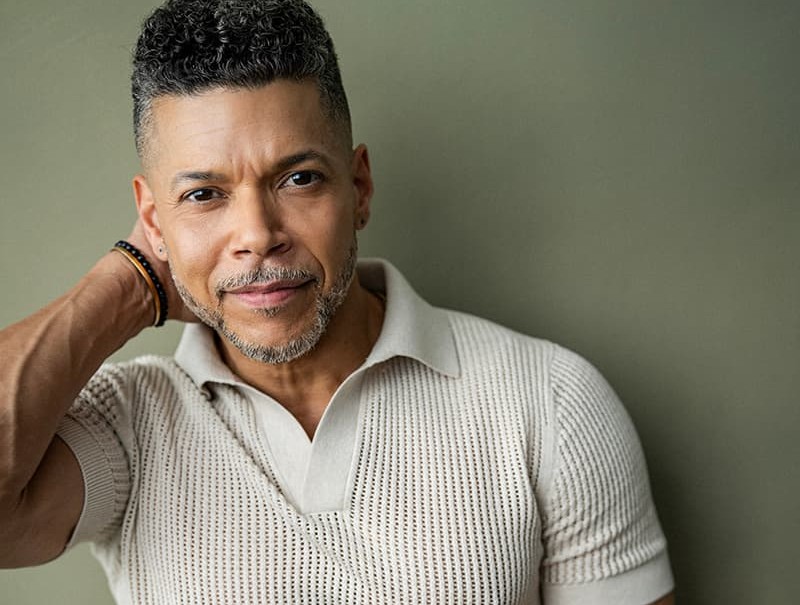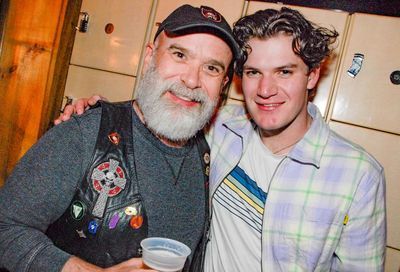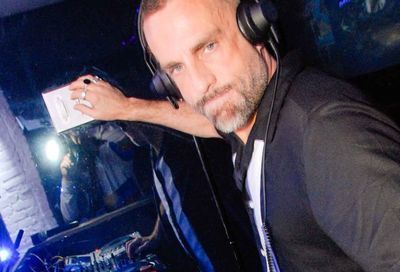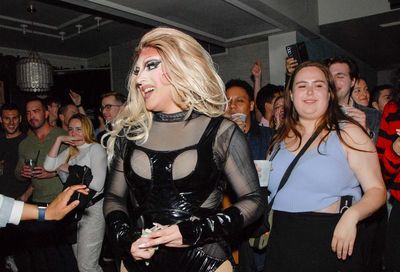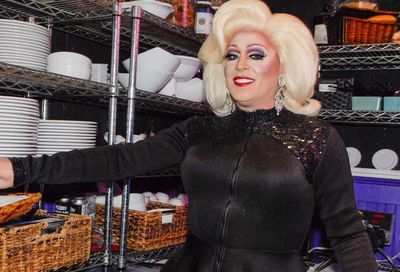Irresistible Tituss Burgess
The rising sitcom star takes a break to talk about Unbreakable Kimmy Schmidt, the show that's making him a part of Netflix's "Must-Stream TV"

Working with Tina Fey is like swimming in the ocean with an Olympic Gold Medalist for swimming as a lifeguard,” says Tituss Burgess. “I feel so safe. And safety while creating is one of the most important ingredients, because it breeds more creativity. It makes you feel safe to fuck up, pardon my expression.”
Expression pardoned. Yet, if Unbreakable Kimmy Schmidt is any indication, there are few, if any fuck ups from Burgess (or any of his similarly gifted castmates). His spectacularly funny turn on the Netflix series, co-created and written by Fey and producing partner Robert Carlock, has already earned the actor one Emmy nomination. If things keep going as they are, a win is a forgone conclusion.
Burgess plays Titus Andromedon, the sassy, frequently petulant roommate to Ellie Kemper’s earnest, wide-eyed Kimmy — a young woman who, after being locked in captivity with three other women for 15 years by a demented doomsday-paranoid preacher, is rescued and starts life anew in Manhattan. Kimmy and Titus are the perfect pairing, with Titus’ eye-rolling exasperation with Kimmy weirdly balanced by his near-pathological desire to ride her coattails to fame.
The show started life as a typical fish-out-of-water story, as Kimmy navigates, often with misguided help from her flamboyant roommate, the vast changes in a society that has left her stranded in ’90s amber. Over the course of its first season, however, underneath the humor (and there are as many laughs as there were in Fey’s previous hit, 30 Rock), the show gradually became a social commentary lambaste, tackling everything from society’s passive racism to the devestating (yet hilarious) impact the end of a marriage has on Kimmy’s employer, brilliantly portrayed by Jane Krakowski in full self-absorption mode.
“There’s a real basis and truth in this show, even though the characters started out seeming absurd,” notes Carol Kane, who plays Kimmy and Titus’ nutcase landlord, Lillian Kaushtupper. “I feel so grateful to have the quality of the writing and the other actors be so high. I just feel like I fell into a vat of cherries.”
Keeping spoilers at bay, in Season 2 — which debuts its binge-worthy 13-episodes on Netflix this Friday, April 15 — we’ll learn more of Lillian’s checkered, criminal past, as well as meet the flamboyant Titus Andromedon’s tempestuous ex, “right away,” teases Burgess.
Like his character’s namesake, the 37-year-old Athens, Georgia native had Broadway aspirations. Unlike his namesake, he actually achieved them. In 2007, he originated the role of Sebastian the Crab in Disney’s stage-adaptation of The Little Mermaid, and two years later stepped into one of contemporary musical theater’s most iconic characters, Nicely-Nicely Johnson in the 2009 revival of Guys and Dolls. It’s safe to say, Broadway has been good to Burgess. Netflix — and Fey, who cast Burgess in seasons five and six of 30 Rock as D’Fawn, a member of Tracy Jordan’s wife’s entourage — has been even better.
Burgess attributes much of his current success, graciously, to Fey.
“I’ve never met a harder working person — her focus is everywhere and you, simultaneously,” he says. “Watching her journey around a joke is a lesson in brilliance. Everything that comes out of her is funny. She’s just a lovely, lovely woman and so gracious and just the picture of class.”
The very same could be said for Burgess.

METRO WEEKLY: When did you first realize you were gay?
TITUSS BURGESS: I knew very early on. There was not a whole lot of self-discovery — I came out discovered. I grew up in Athens, Georgia, and the neck of the woods I was from, it wasn’t something you talked about, or displayed if you were effeminate. But it wasn’t something I necessarily hid.
MW: How old were you when you came out?
BURGESS: I had a formal conversation in my late teens but I’ve always had a very “This is it, and if you can’t accept it, it’s your problem, not mine.” That has served me throughout my life. When it comes to my well-being, how other people feel is not my concern. I never had real trouble accepting myself. It was more trying to figure out how to get other people to learn how to accept.
MW: How did your family take it?
BURGESS: My mom had a difficult time, and on some levels still struggles with it, but she’s the only one I really cared about. My mom and I are thick as thieves, and her feelings are important to me. But even with her, at a certain point, I had to just go, “Look, we’re not going to talk about this again. Go get some group counseling, figure something out, so that you can better deal with this.” I’m 37 now, and even as recent as last year we had some issues with it. For some people, it’s a lifetime of integrating the information. For others, it’s like, “Well, all right, no big deal.” I’ve always been a “Well, no big deal.” There are so many other things to be concerned about, my lord.
MW: The character you play on Kimmy Schmidt so craves the spotlight, so craves fame. Are there any similarities there?
BURGESS: No. I don’t crave the spotlight. I don’t crave attention. In fact, I try and get people to leave me alone — I don’t like a lot of people around me. I pick up on energy very easily, so if you walk in the room and I can feel what you’re feeling, it exhausts me. What I do for a living requires so much of all of me that by the time it’s time for me to go and do whatever it is that I’m supposed to be doing, if I haven’t protected myself, all that energy is gone.
The spotlight, for me, is a byproduct, a residual effect, of what I love to do. And what I love to do is perform and create. The spotlight is empty outside of just applause and attention but, you know, even while you’re receiving that you are still participating. But by the time I’m done filming, I’m quite ready to hang Titus up and go hide for a little while.

MW: Prior to the show, you had a stellar career on Broadway.
BURGESS: I was in the original casts of every show I’ve ever done.
MW: One of your most heralded was as Sebastian the Crab in Disney’s Broadway production of The Little Mermaid.
BURGESS: You know what, I gotta tell you, that was one of the most charmed experiences I’ve ever had in my entire life. My entrance was on an elevator that rose out of the orchestra pit, and when you hear that collective gasp from all the kids in that first couple of rows, it makes doing it night after night so worth it. And that score is so beautiful — I got to sing two of the most famous songs. It just was a dream come true.
MW: There are those who bemoan that Broadway is becoming too “Disney-fied,” that less and less serious musical works are being produced in favor of family fare based on animated films. Do you feel this is a good trend for Broadway?
BURGESS: This is wonderful for Broadway. Now listen, Broadway is less about art and more about commerce, obviously, and while once upon a time it was more balanced, or even maybe even tipped in the direction of art, the costs are rising. It costs a lot of money to mount a show. And producers are becoming less and less visionary, and more “How we can get the max amount of dollars back on our investments?”
I would like to see more risks taken. I have not seen Hamilton yet, but apparently it’s replete with wonderful artistic content. And there are a lot of shows this season that are quite moving. I just recently saw — it’s closing, but it won the Tony — The Curious Incident of the Dog in the Night. Probably the most magical theatrical experience I’ve ever had as an audience member. I think it just takes the right director, the right writer and a producer who knows how to get out of the way and let these people do their jobs to steer Broadway back in the direction of content first, commerce a close, close second.
MW: But there are so many screen-to-stage musicals these days.
BURGESS: Screen-to-stage doesn’t bother me if the translation is done with respect to the source material, or if the stage version is going to improve upon what we saw [at the movies]. But if it’s just going to lump and throw the movie onto the stage without maximizing all the resources that we have in theater, then what’s the point?
I have no problem with Disney using their archives to create new material for the stage, because who doesn’t want to go to the theater and lose yourself? Taken down that nostalgic road of when you were a kid and were coming up with all of these stories. These stories are around to this day for a reason. So I think it’s important. I think there’s a place for it.
MW: That’s a great outlook. I used to defend Starlight Express as a great way to introduce children to theater. I mean, it’s pure spectacle, but it’s got a great score and, well, you don’t want to necessarily take a child to Phantom of the Opera.
BURGESS: Well, it depends on how sophisticated your child’s palate is. But I completely agree with you.
MW: With Kimmy Schmidt, you’ve had a huge breakthrough of visibility. What has that been like for you?
BURGESS: Well, when you’re inside of it, it’s hard to see the forest for the trees. I wake up, I go to work, I love my job, and I absolutely adore the people that I get to work with. I never have to worry about trying to make something funny because when I read it, it makes me laugh right away. And I’ve not always had the luxury of working with writers who didn’t need help from actors. Sometimes you have to string air together. Every script is not as polished or sophisticated as the ones my current bosses [Tina Fey and Robert Carlock] write. So it’s been great.
As far as the visibility, I said earlier I’m not that eager or crazy about attention, so I don’t pay a great deal of attention to the press or you know, the superlatives that people give me. I certainly appreciate them because it means that they are enjoying the work I am doing. But for me, it’s about the work. As boring as that sounds, that is what excites me and what makes me wake up in the morning and want to do it all over again.
MW: The show becomes progressively more absurd as it goes along.
BURGESS: In the most brilliant way.
MW: Yes, and the interesting thing is that it also becomes more grounded in reality at the same time.
BURGESS: It sure does, doesn’t it? Particularly with its acknowledgment of what is going on in our social political climate in America. It helps ground it even more — and it also allows for the absurdity to be more palatable, because it has a backdrop of something so serious.
MW: I don’t think I’ve ever seen a TV show do that so successfully. I’ve seen them go one way or the other but I don’t think I’ve ever seen them actually traverse the same path simultaneously.
BURGESS: I don’t know that I have either, to be perfectly honest with you.
MW: A straight friend asked me of your character, “Do you find it at all offensive that he’s so stereotypically effeminate?” And I said, “No, not at all.” Still, I can see why he’d ask that. What’s your take?
BURGESS: I don’t think there’s anything stereotypical about Titus. How many gay people do you know who are effeminate? Lots, right?

MW: A fair amount.
BURGESS: If they exist in the world, then they certainly can exist on television. If it happens in the world, if it happens to human beings, if there are human beings who house it, if there are human beings who say it, if there are human beings who wear it, it is fair game. There is nothing in terms of the writing or in my execution that is off-putting in the way that could be considered a stereotype. People should pay less attention to how people act and more to what they are trying to work out in their lives — I think that is what is important. We don’t play up how “queeny” Titus is. We are enjoying how he handles the situations he finds himself in. And I think that is more important than focusing on whether or not he raises his pinky when he drinks a glass of wine.
MW: Do you find there’s homophobia within the gay community towards effeminate men?
BURGESS: Absolutely. Absolutely.
MW: How do we respond to that?
BURGESS: That is a much larger conversation than I can answer in one sentence, but I think it stems from self-hatred. We were made to hide for so long, to repress how we naturally come into the world for so long, that we begin to agree with those who are in opposition. We start to feel that people are supposed to act and be a certain way. It exacerbates something that probably lives deep down inside of you.
It is unfortunate that we can be so divisive and unwelcoming of anyone that’s different. But intra-hatred within the community is no different than the intra-hatred in the human race. We fear what we don’t understand.
If effeminate gay men were left alone all these centuries ago, and were treated like whole human beings, the landscape of television would have changed a very long time ago, and the sight of a gay man, whether he was “straight acting or effeminate,” wouldn’t be shtick. And I think Tina Fey and Robert Carlock are tackling that and normalizing it so that now we can appreciate what Titus Andromedon, the human being, is experiencing in New York City, not what this black, gay, effeminate male is doing and how he’s sassing it up on the screen.
MW: You’re a gay actor playing a gay character. Noah Galvin is a gay actor playing a gay character on that great new sitcom, The Real O’Neals. Hopefully this is a new trend, as in the past most of the gay roles went to straight actors.
BURGESS: I have to be honest with you, my friend. I don’t know why that’s interesting. I mean straight people play straight people all the time. I don’t think they find that interesting. What’s interesting is playing an interesting character — who he sleeps with it is the least of it. It’s about what he goes through in life — and Titus goes down some really crazy paths. That is what’s interesting, not the fact that he likes to kiss boys.
MW: Do you worry about typecasting?
BURGESS: No, not at all. I’m an actor. I can do anything. It hasn’t been a problem yet.
MW: One of the most interesting episodes in the first season is the one in which Titus is dressed as a werewolf and finds that people treat him better as a monster than as a black man. It’s a funny episode, and yet it makes an incredibly powerful social statement.
BURGESS: It’s sad. It’s depressing. It’s one of the funniest, most depressing episodes I think I’ve ever filmed of anything I’ve ever done. It’s so unfortunate and it’s horrifying that it’s not so far from the truth. And being in an election season — election years bring out racism like nothing else I’ve ever seen — they handled it with class. You were laughing before you realized, “Oh, shit, this is real.” This is something that is very topical and that unfortunately, you know, we are still living in a time where so many minorities are shunned and not allowed to be treated with respect that we come into earth naturally having the right. It’s unfortunate.
MW: How do you feel about the election season right now?
BURGESS: Oh, lord have mercy.
MW: That’s one way to put it.
BURGESS: Truly, lord have mercy. I am cautiously optimistic. I’m choosing to believe that there are more humans who are in favor of justice and what is right for the world than there are humans who will promote candidates who will see to it that rights are taken away. I’m choosing to believe that we will come out going further in the direction that Obama tried to take us, barring a Republican-run Congress. I’m choosing to believe that we’re going to come out of this having learned a very valuable lesson and I hope it doesn’t take a president like Trump to snap us out of it.
MW: What happens to this country if Trump becomes President?
BURGESS: Oh, god. Well, look at the kind of campaign he’s running. So if that’s any indication, we’re gonna be in the shitter.
Season 2 of Unbreakable Kimmy Schmidt will stream exclusively on Netflix starting Friday, April 15. Visit netflix.com.
Support Metro Weekly’s Journalism
These are challenging times for news organizations. And yet it’s crucial we stay active and provide vital resources and information to both our local readers and the world. So won’t you please take a moment and consider supporting Metro Weekly with a membership? For as little as $5 a month, you can help ensure Metro Weekly magazine and MetroWeekly.com remain free, viable resources as we provide the best, most diverse, culturally-resonant LGBTQ coverage in both the D.C. region and around the world. Memberships come with exclusive perks and discounts, your own personal digital delivery of each week’s magazine (and an archive), access to our Member's Lounge when it launches this fall, and exclusive members-only items like Metro Weekly Membership Mugs and Tote Bags! Check out all our membership levels here and please join us today!






